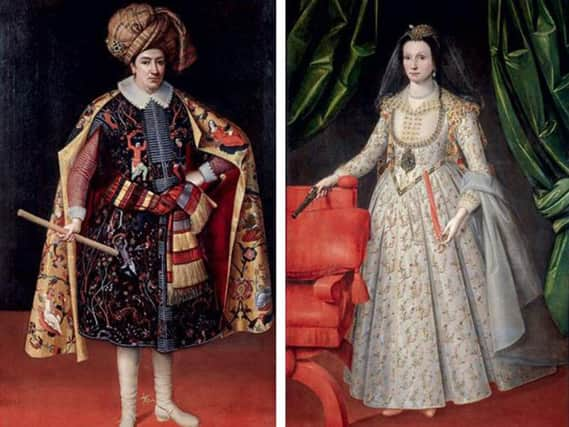More adventures of the swashbuckling Shirley family


Both became Sussex MPs and the young Thomas went on to pursue a life of extraordinary adventure. He also had two younger brothers destined for equally colourful careers and here are their tales.
Second eldest Anthony Shirley was born in the family home, Wiston House near Steyning, Sussex, in 1565. Like his brother he gained military experience fighting the Spanish in the Netherlands and also in Normandy where he was knighted by the French monarch, Henry IV. Evidently a somewhat capricious lady, Queen Elizabeth took umbrage at this honour and had Anthony locked up for a short time. Earlier the Queen had also imprisoned his elder brother in a fit of pique at his marrying a royal maid without her consent.
Advertisement
Hide AdAdvertisement
Hide AdAnthony’s life mirrored that of his brother in other ways. In 1596 he took a seven-ship flotilla on a privateer mission along Africa’s west coast. Seeking richer pickings he then sailed across the Atlantic intent on raiding Spain’s Caribbean colonies. The expedition did not fare well and with sickness endemic most of his men mutinied. Late in 1597 Anthony returned to England with just a single vessel.


With the aim of encouraging trade links with England, he next led a mission to Persia, a land ruled by the Safavid dynasty. At the same time he and his entourage were to instruct the Persian army in English military drill and the latest artillery techniques to assist them in the endless Shia versus Sunni Islam-inspired conflict with their Ottoman neighbours. The Safavids and Ottomans, along with India’s Mughals, are known to history as “Gunpowder Empires” due to their eager embrace of new-fangled firearms.
Sir Anthony went to Aleppo, the city in present day Syria, and received a friendly reception from the Safavid Shah, Abbas the Great. He made the Englishman a “Mirza”, equivalent to a prince. The Shah then granted trading rights to all Christian merchants.
Sir Anthony’s achievement was not appreciated in London, most likely because England did not have exclusivity. Indeed, he learnt he would not be welcome home. Instead he became an emissary for the Shah and his subsequent travels took him to Moscow, Rome and other cities.
Advertisement
Hide AdAdvertisement
Hide AdIn what seems to have been an occupational hazard for the Shirley family, he ended up in prison in Venice for a while for an offence unknown. In 1605, Rudolph II, Holy Roman Emperor, sent him to Iberia. For added gravitas Rudolph first made Sir Anthony a count. In Madrid an impressed King of Spain gave him command of a fleet and invited him to plunder Turkish-held islands in the Levant. This again echoes his brother’s experience of a few years earlier and Anthony was equally unsuccessful in a raid on Lesbos. Back in Spain he was relieved of his post. It seems he wasn’t wholly disgraced as he settled in Madrid where he would die in 1635.


The youngest Shirley brother, Robert, also attracted a knighthood at an early age. He accompanied Anthony on his Persian excursion. When his brother set off on his travels on behalf of the Shah, Robert remained in Persia. There, in 1607, he married Sampsonia, a Christian lady descended from Circassian nobility. She took the additional name Teresia.
In 1608 Shah Abbas sent Robert and Lady Teresia Sampsonia to Europe seeking an alliance against the Ottoman Turks. He met with James I in London and delighted society by wearing exotic Persian clothing. In the event European intervention was not needed; the reorganized Persian army had grown powerful and was able to score a decisive victory over the Ottomans.
In 1609 Robert and his wife were in Madrid with Anthony. Robert returned to Persia for a while in 1613 where he had a chance meeting in the desert with intrepid English explorer, Thomas Coryat, a pioneer travel writer.
Advertisement
Hide AdAdvertisement
Hide AdRobert’s final journey to Persia came in 1627 as an escort for the first official British ambassador to the Safavids. Taken ill, he died at Qazvin, in what is today northwest Iran. He was buried there but in 1658 his wife arranged for Robert’s remains to be taken to Rome. Sampsonia died in a convent in the city in 1668.
The story of the Shirley siblings is a convoluted one and with all three bearing the same surname it is easy to get confused as to who did what and when. Fortunately there are extensive written records that have survived. For example, the 1613 manuscript of Sir Anthony Shirley’s autobiography resides in Oxford’s Bodleian Library.
My own sources include “Worthies of England” by Thomas Fuller, an exhaustive 1662 paean to the great and the good of every English county. In the chapter on Sussex he features the Shirley family’s exploits.
I’ve only space to include his somewhat generous conclusion concerning Sir Anthony’s less than glorious 1596-97 Caribbean foray: “At last, being diseased in person, distressed for victuals, and deserted by all his other ships, he made by Newfoundland to England, arriving on 15th June. Now although some behold his voyage, begun with more courage than counsel, carried on with more valour than advice, and coming off with more honour than profit to himself or the nation (the Spaniard being more frightened than harmed); yet impartial judgments, who measure not worth by success, justly allow it a prime place amongst the probable (though not prosperous) English adventures.”